Volume Seven – 1688 – 1714
Glorious Revolution, the Last of the Stuarts
WILLIAM AND MARY
ROYAL CELEBRATIONS
QUEEN MARY
MARY’S MORAL CAMPAIGN AND DEATH
DEATH OF AN HEIR
WILLIAM’S DECLINING HEALTH AND DEATH
QUEEN ANNE
JOHN AND SARAH CHURCHILL
BLENHEIM PALACE
A ROYAL FALL-OUT
DEATH OF PRINCE GEORGE
DEATH OF QUEEN ANNE
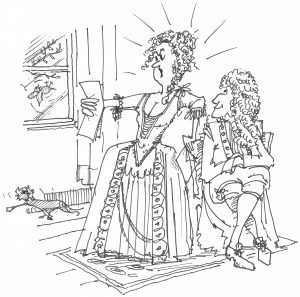
WILLIAM AND MARY
Prince William: a man of honesty,
Diligence, courage and true modesty.
He shunned popularity, eschewed fame,
And entertained no flatterers. The game
Of party politics he found absurd,
Contrived and wasteful. “Stately and reserved”
Was Evelyn’s judgement. Few could pretend
To any idea where it would end.
A new Rebellion? Heaven forfend!
The chances of peace, some felt, were remote.
“Ambition and faction feared,” John wrote.
For who was King? Had James ‘abdicated’?
Had he ‘deserted’? Had he ‘vacated’?
Could the ‘late’ King be brought to his senses?
Tories feared the awful consequences
Of abdication. ‘Incapable’, yes;
But ‘insane’? Well, no… A terrible mess.
Practical politics, no more, no less,
Determined the outcome. A group of peers
Were assembled, to address urgent fears
Of anarchy, distrust and dissension.
They resolved to summon a Convention,
Which in turn would decide the succession.
They invited the Prince, in the meantime,
To keep the peace. It would have been a crime,
A grand folly, had they not. They’d no choice.
William’s became the dominant voice
From that day forth. Yet he took care, the while,
Not to be pushy, to keep his profile
Modest and moderate. Such was his style.
The 22nd of January,
1689, marks, it seems to me,
A key moment in England’s history.
The Convention, elected freely –
A new Parliament, effectively –
Met to decide the country’s destiny.
Sadly, it took them an age to agree.
They explored every possibility,
Until William threatened (yes, really)
To beat a path back to the Netherlands.
It was difficult. This one understands.
James had scarpered. Few folk wanted him back.
So far, so good. But his status, alack,
Was obscure. Had he given up the right
To his kingdom by neglecting to fight?
Kings shouldn’t slope off in the dead of night
To seek refuge in France, for Heaven’s sake.
Yet to grant Will the crown on a handshake,
A wing and a prayer were a mistake.
His claim was weak. Moreover, he was Dutch.
A foreign Prince? No thank you very much!
Should Mary rule as Regent? Yes, rather,
Opined some. Her fickle, feckless father
Would still remain as King, but the Princess,
His daughter, would take the reins. I should stress
That this was an uneasy compromise
And found favour with few. It’s no surprise
That Orange himself was set against it.
Neither he nor Mary liked it one bit –
Indeed, I’m advised she had a wee fit.
The Convention got tied up in knots
Over the proposals. Tories (the clots)
Loathed the whole concept of abdication:
A King was a King. The situation,
Though, admitted of no such certainty.
Some argued, by right of heredity,
That the crown passed directly to Mary.
She should reign as sole monarch, on her own,
Apart from her husband: one Queen, one throne.
“In your dreams!” was her spirited reply.
The Princess claimed that she would rather die
Than require her beloved spouse to bow
To her will. Who was the Prince, to kowtow
To his wife? She kicked up a rare old furore.
Mary wrote to Danby, her friend of yore:
She refused to be Queen (and this she swore)
Without William regnant by her side.
There wasn’t, in truth, much more to decide.
Take it or leave it! It were suicide
To settle otherwise. Leaving aside
The ‘spurious’ claim of James’ baby son,
It was plain as a pike to anyone
That Mary was James’ legitimate heir.
So Will became King (however unfair):
King William the Third. He and Mary
Were offered the crown jointly, contrary
To precedent. All talk of ‘divine right’
Was abandoned. Even Tories took fright
When faced with the dire alternative
To the Prince: anarchy. Whigs, as I live,
Were jubilant. They’d long argued, and loud,
That in the last resort it was ‘allowed’
To ‘replace’ a King, should he prove too proud,
Too arbitrary – a despot in fact.
James had let down his people. England lacked
A King. As simple as that. James was sacked.
Back to top / Buy the book
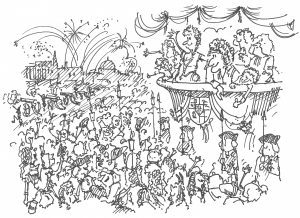
ROYAL CELEBRATIONS
So, on the 13th of February –
Which in this year fell on a Wednesday –
Will and Mary were proclaimed King and Queen.
“Bonfires, bells, guns… ” wrote John. A wondrous scene!
The whole fandango had a novel ring.
There was no precedent, simply nothing,
To herald (far less to legitimise)
A joint monarchy. So it’s no surprise
To find a good old English compromise:
A fudge, a muddle. A ‘Declaration
Of Rights’ they called it. The situation
Called for weight, solemnity, gravitas
And consequence. If the outcome was crass –
Well, vague, let us say, that’s rather more fair –
There was surely nobody more aware
Than King William himself. He ceded
Some powers, but no more than were needed.
Back to top / Buy the book
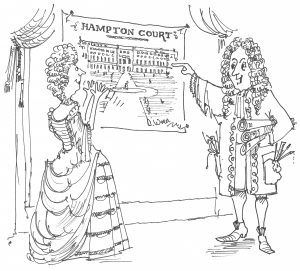
QUEEN MARY
While the King was on manoeuvres abroad,
Mary held the reins. Far from self-assured,
The Queen would never be completely cured
Of her sweet love of domesticity.
In Holland she’d enjoyed more privacy
Than in England, a more retired life.
William had come to worship his wife
And (although he entertained a mistress,
Betty Villiers, which caused, I confess,
The gentle Queen not a little distress)
Mary gave her husband her heart and soul
And returned his devotion (on the whole).
The Queen was quite a one for cards, we’re told,
And gossip. She ran the royal household
With a calm, measured efficiency
And lived a life of simple decency.
Gardens were a passion; palaces, too.
She asked Sir Christopher Wren (wouldn’t you?)
To redesign Hampton Court. This he did.
His plan to demolish (Heaven forbid)
The whole Tudor fabric was left undone
After Mary’s death, though it was begun.
Yet, to the delight of everyone,
The commanding fronts to the south and east
Went forward – a fine legacy, at least,
For Wren. A rare architectural feast.
The Regency Act devolved to Mary
The King’s powers in his absence, scary
For a woman of her simplicity
And artless innocence. It seems to me
That she acquitted herself royally.
She failed to act wholly honourably
Over the débâcle that was Beachy Head.
Whether or not she’d been too easily led
By her ministers, the go-ahead to engage
Was given by the Queen. It’s difficult to gauge,
I’m sure, but our ships’ numbers were fifty-eight
Against the French fleet’s seventy-five. Not great,
You’ll agree. It seems she didn’t hesitate,
But Admiral Torrington suffered defeat.
He’d strongly opposed risking the allied fleet,
Yet he was overruled. And who took the rap?
You guessed it: the Admiral himself, poor chap.
Beachy Head apart, Queen Mary did well.
How pleased was William? It’s hard to tell.
The Queen would always express her relief
At the King’s return, but it’s my belief
His Majesty had little cause to beef.
Back to top / Buy the book
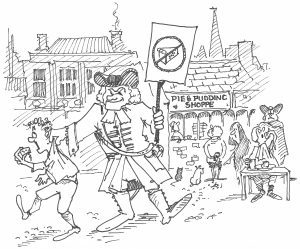
MARY’S MORAL CAMPAIGN AND DEATH
The Queen, it’s true, did go rather too far
In the field of public morals. Bizarre,
You’ll agree, but she tried to ‘raise the bar’
In seeking to encourage piety
By clamping down on inebriety
(Drunkenness) and a wide variety
Of sinfulness and impropriety.
A regular host of orders she gave
In the hope of forcing folk to behave.
One edict that gave rise to mild surprise
Was a ban on eating puddings and pies
In the street on the Sabbath. These cases,
Quietly dropped, caused a few red faces.
Mary’s death was sudden and unforeseen.
The pious behaviour of the Queen
“In all her sickness” (so writes Evelyn)
Impressed all witnesses. To her chagrin,
No doubt (in Heaven, in her element),
A vast sum, fifty thousand pounds, was spent
On her funeral. A sombre event,
And unique – for members of Parliament,
For the first time in memory, were present.
Parliament is routinely dissolved
Upon the monarch’s death, but was absolved
On this occasion: the King lived on –
So did Parliament. The Queen was gone.
“Never so universal a mourning,”
Recorded Evelyn. Without warning,
Mary passed from this world. Smallpox was rife.
This scourge it was that claimed the young Queen’s life.
“Full of spots” (John again), they say she knew
She was dying. What could the doctors do?
Nothing. On the 28th of December,
1694, Mary died. Remember,
If you will, that the poor King’s parents, both,
Had succumbed to this illness. He was loth
To believe that his precious wife, too,
Could suffer the same. Good husband and true
(Well, by the standards of the time), he slept
In her sick-chamber. He fretted and wept.
For months after, the King was stricken with grief.
He’d come to adore his Queen, that’s my belief,
With a touching, rare and far-reaching passion –
In an age when love was hardly in fashion.
Back to top / Buy the book
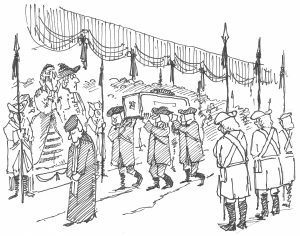
DEATH OF AN HEIR
1700 was a dismal year,
Deadly, depressing and lacking in cheer.
The young Duke of Gloucester, Anne’s son and heir,
Died, aged eleven. It hardly seems fair:
From seventeen pregnancies, just one child
Survived infancy. Personable, mild
And of a lively wit was the poor Duke.
Never one word of censure or rebuke
Did he merit. Fortune had smiled on Anne:
She doted on William, her little man –
As did his uncle the King, we’re told. Anne’s son
Was the light of her life. Everyone
Saw in him the hope of the Stuart line
And the Protestant succession. Fine –
Till Death dealt his sudden and cruel blow.
Was the Princess still likely to breed? No.
Far less the King. So, the succession
Topped the agenda. Who (good question)
Would succeed after William’s demise
(Or Anne’s)? Not (this comes as little surprise)
James Francis Edward, the young half-brother
To Anne, who’d later strive to recover
His crown (as would his son) in dashing style.
Catholic, both, they failed. Folk were hostile.
Back to top / Buy the book
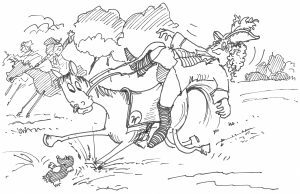
WILLIAM’S DECLINING HEALTH AND DEATH
It’s telling that the King himself held back
From the task in hand. The sad truth, alack,
Is that the King was tired. The huge strain
Of combating France, his lifelong campaign,
Was taking its toll. A long-drawn-out war –
It wouldn’t be short, of that he was sure –
Was like to outlive him. Hardly a fan,
Marlborough, he knew, was the ‘coming man’.
Indeed, so it proved under good Queen Anne.
The King’s health was failing – painful, but true.
Remember, he was pushing fifty-two,
No disgrace for a chronic invalid.
Will could never be called high-spirited,
But, as his cough took a turn for the worse,
His delicate lungs gave him cause to curse.
His legs swelled and he found it a struggle
To manage a horse. He took a tumble
One February day, out on a ride
In Richmond Park. This he took in his stride,
Despite a fractured collar-bone. In pain,
The King bounced back pretty quickly again.
Or did he? By March it was all too plain
That Will was suffering a sharp decline.
He was feverish (never a good sign)
And off his food. He accepted his end
With equanimity. His lifelong friend,
William Bentinck, 1st Earl of Portland,
Was present at his death, we understand.
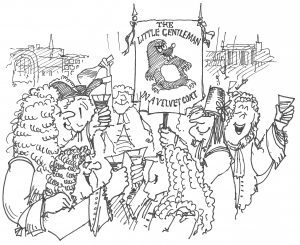
It seems unlikely that the cause of death
Was a molehill – but I should save my breath.
Jacobites were wont to toast (they loved to gloat)
“The little gentleman in a velvet coat!”
William the Third: an outstanding King –
One in a million, that’s my thinking.
He showed a rare political good sense
In dealings with all his Parliaments,
Playing neither the pushover (as if!)
Nor the autocrat. The odd awkward tiff,
Even a calculated stand-off, fine;
But William knew where to draw the line.
This highly gifted, forward-looking King
Took on a nation that was ailing –
No, let’s be honest here, that was failing –
And made it fit for the modern world. He,
This Prince from Holland, single-handedly
Prepared us for the eighteenth century.
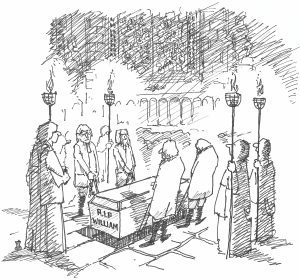
King William was little mourned, sadly.
The fickle English had taken badly
To their modest, hard-working sovereign:
Pious and strong – too bad he was foreign!
His subjects were disgruntled, over-taxed
And xenophobic. Will never relaxed.
Our chum John Evelyn, far from tearful,
Declares himself not a little fearful
For England’s prospects following the King’s
Untimely demise. The diarist wrings
His gnarled hands: “disturbance of the City”
He fears; “matters… abroad” (more’s the pity)
“And at home” all in “too loose a posture”
To “resist the deluge” (the imposture)
“Of the French”; Europe’s “most dangerous war”,
Ready to break. Old John, he knew the score.
One might have expected England, therefore,
To be wracked with regret, gloom and despair.
Nothing was further from the truth. Nowhere
Was the late King lamented. Far from fair.
Poor Will was dead. No one seemed to care.
Few there were who knelt to say a prayer.
The King was interred in Westminster Abbey,
In private, at night – decidedly shabby.
This finest of men was quickly forgotten.
No statue. No monument. Sickening. Rotten
Back to top / Buy the book
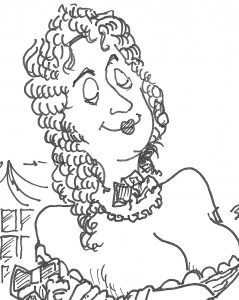
QUEEN ANNE
Queen Anne was quick to leave nothing to chance.
She made an early impression. France,
She told Parliament (her first address),
Was her focus of concern. Great sadness
Anne expressed at the passing of the King.
Did her nose grow? There’s no way of knowing.
She was devoted to the maintaining
Of the Protestant succession, law
Religion and liberty. She bore
The weight of her responsibility
With a keen sense of the difficulty
That now attended her. It seems to me
Her speech was well judged. Anne spoke “without book”.
She’d memorised the lot. Some nerve this took.
In a surely deliberate echo
Of Queen Elizabeth, she said: “I know
“My heart to be entirely English”. So,
In that one telling aside, at a stroke,
She swatted Will away, the odd Dutch bloke.
Anne’s strengths were her honest sense of duty
And her lifelong piety. No beauty,
Her shyness and lack of ostentation
Belied a hidden determination
To serve her subjects with dedication
And resolve. Her childhood education
Had been meagre. Gone were the glory days
When princesses had been coached in the ways
Of the ancient arts: philosophy,
Latin and Greek, logic, theology…
And modern interests: geography,
Languages… Even English history
Remained a comparative mystery
To Anne. She was fluent in French, it’s true –
But of science and politics she knew
Little or nothing, and she now Queen. Phew!
From an early age she held a fixed view
Of the world within a limited field.
Once her mind was made up, she’d rarely yield.
Strength or stubbornness? Well, you can decide.
Anne’s reign, you’ll find, was a pretty rough ride.
For full eleven of the twelve short years
Of Anne’s glorious reign (blood, sweat and tears),
England was at war in Europe. For Spain?
In defence of the Dutch? For her own gain?
Messy and complex, it’s hard to explain –
But explain we shall. King William’s reign
Was distinguished, sadly, towards its end
By a jingoistic, bellicose trend.
Even the obdurate Tories, it seemed,
Pledged their support – all that Marlborough dreamed.
Back to top / Buy the book
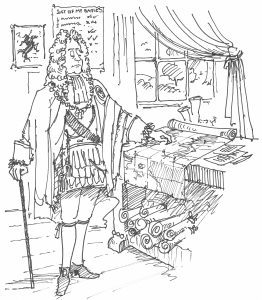
JOHN AND SARAH CHURCHILL
Now in his fifties, hardly a young man,
Marlborough’s mighty mission began.
The Queen, of course, had been ever a fan.
Married to her first friend and favourite,
Sarah (the Countess), Marlborough was ‘fit’.
His wife stepped neatly into her new role.
Great power she wielded: Groom of the Stole,
Keeper of the Privy Purse, and Mistress
Of the Robes. Twenty-four-hour ‘access’
And five thousand pounds per annum, no less,
Were the perks. The Queen, I have to confess,
Held Sarah in something akin to awe.
When finally forced to show her the door,
Anne was distraught: not friendship, but passion –
Smashed to pieces in breathtaking fashion.
Yet Marlborough staked his own claim to fame.
Supreme Commander-in-Chief he became
Of the allied forces. He made his name
With an impressive string of victories
From Bavaria to the Low Countries:
Blenheim (his finest success), Ramillies,
Oudenarde and, by far the most bloody,
Malplaquet. As a martial study,
The Duke (as he became) is of first rank.
Anne and England had Marlborough to thank
For the happiest triumphs of her reign.
The good Duke delivered, time and again.
Back to top / Buy the book
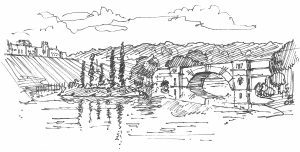
BLENHEIM PALACE
Do visit Blenheim Palace. It astounds.
Be sure to leave time to take in the grounds –
The Park, in particular. My advice
Is this. Avoid the main gate; sacrifice
The long, straight drive with its commanding view
Of the Palace. I’d head, if I were you,
For the town entrance. Simply continue
(From Oxford) past the gates. At the old school
(On your right), take a left into the square;
Turn the corner past the Church and you’re there.
Then walk through the arch. You may have to pay,
Though all Woodstock residents, in my day,
Could go for free, I’m delighted to say –
Courtesy of the Duke, such was his way.
Behold the view! Vanbrugh’s grey stone bridge,
Spanning the cool lake. A rare privilege.
I’m prejudiced. Why take my word for it?
Prepare for the most amazing visit.
Back to top / Buy the book
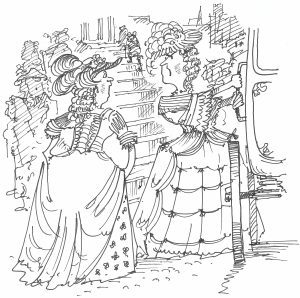
A ROYAL FALL-OUT
The friendship between Sarah and the Queen
Had reached breaking point. The Duchess was mean,
Manipulative, unkind and jealous.
Poor Anne was at her wits’ end, but zealous
In her ill-advised attempts to maintain
Their old familiarity. The strain
Was patent, with the Queen over-eager
To placate the awful Duchess. Meagre
Was her reward. So Anne stepped up the pace,
Pleading (nay, begging) – a perfect disgrace.
The wretched Sarah failed to know her place,
That was the nub of it. She was vain, rude,
Wilful and arrogant. Yet she was shrewd.
She judged the Queen’s vulnerability,
Her childlike neediness, down to a T.
Just one example may serve to suffice.
A most furious row (not at all nice)
Blew up in their coach, en route to St. Paul’s,
To give thanks for Oudenarde. Public brawls
Are rarely attractive. This one appals.
The Duchess started to harangue the Queen
As they disembarked from the coach. I mean!
There, on the Cathedral steps! The scene
Was witnessed by high and low alike. Obscene.
Anne made to answer… Sarah wouldn’t buy it.
To her mistress’s face she snapped: “Be quiet!”
Not content with this open show of wrath,
She later wrote a letter (no, don’t scoff),
Accusing Anne of ruining her day –
As if the poor soul had stood in the way
Of Marlborough’s triumph. The Queen’s dismay
Was brushed aside. Her conduct, Sarah claimed,
Was “shocking”. For Anne was the party blamed,
As ever. She was made to feel ashamed.
Perversely, though, the Queen it was who cried.
The cold-hearted Sarah remained dry-eyed.
Things had not always been thus. It’s so sad
When early, golden promise turns to bad.
Back to top / Buy the book
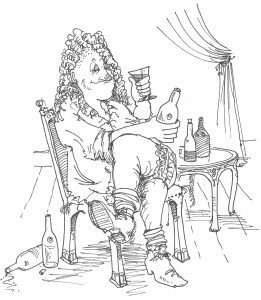
DEATH OF PRINCE GEORGE
Death now overshadowed everything.
Anne’s beloved George, her dearest darling,
Died in October, 1708.
Lumbering, taciturn and overweight,
The Prince was an unlikely candidate
For love. Yet Anne worshipped George, her soul-mate,
Sweetheart and fond companion for life.
The Queen in turn made him the perfect wife.
For George craved no excitement. Not for him
The roar of public affairs. Far from dim
(Though most thought otherwise), it was his choice
To steer well clear of politics. His voice
Was rarely raised (indeed, was barely heard)
At Court. For this, the Prince was thought absurd.
Indeed, the poor old cove was roundly mocked.
Anne’s uncle, Charles the Second (I am shocked),
Is quoted as saying: “I’ve tried him drunk,
“I’ve tried him sober ” (Charles certainly sunk
To new depths) “but there is nothing in him.”
Given the King’s obsession with women,
One wonders whether he was merely peeved
At George’s rectitude. Anne was relieved
That her chosen spouse (not her choice, of course)
Was the ideal match. Strong as a horse,
The Prince drank for Denmark. His appetite,
Too, was colossal. To his vast delight,
This was a solace he shared with the Queen –
The food they consumed was faintly obscene.
A witty item of verse of the time
I can’t resist quoting (though not my rhyme):
“King William thinks all,
“Queen Mary talks all,
“Prince George drinks all,
“And Princess Anne eats all.”
The Queen, indeed, was enormously fat
By the time she died and I’ll eat my hat
If the drink didn’t lead to George’s death –
Though asthma, we’re told, left him short of breath.
Back to top / Buy the book
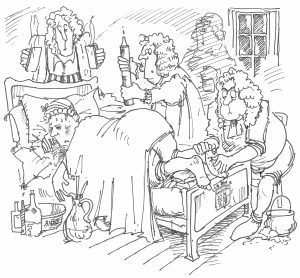
DEATH OF QUEEN ANNE
The Queen’s health was failing. She was tired.
She could take no more. Oxford was fired.
He raged and ranted against Bolingbroke,
In Council, before the Queen. In my book,
Such insolence is unforgivable –
If not so harmful, simply risible.
Six days later her Majesty was dead.
After the fracas Anne took to her bed,
With pains in her hands and “heat in her head” –
This from a contemporary report.
The death of a Queen? A spectator sport.
Cruel as it sounds, the entire Court
Would crowd around. Remember her uncle,
Charles, at his end? Every carbuncle
Sliced and spliced, cruelly anatomised,
His last drop of blood drawn and scrutinised,
‘Cupped’ to death… The poor chap was traumatised.
They fared no better with his niece. Poor Anne.
The Queen’s terminal agony began
With bleeding, vomiting and blistering,
Followed (Lord preserve us) by clystering –
A kind of enema by injection,
To purge her bowels. Her complexion,
They noticed, was livid (are we surprised?),
From which the royal physicians surmised
That garlic should best be rubbed on her feet,
Then next, to make the agony complete,
Hot irons applied to her skin. What fun!
They shaved her head in front of everyone –
Councillors, clergy, attendants, the lot.
The room was fetid, unbearably hot.
Forgive the offence. It’s part of the plot.
Medical practices have improved somewhat
Since the age of the Stuarts, I’m pleased to say.
They were pretty horrific in Queen Anne’s day.
We should conclude. Her Majesty passed away
On Sunday August the 1st, 1714.
Dr. John Arbuthnot wrote this of the late Queen,
As apt an epitaph as ever I have seen:
“Sleep was never more welcome” (I’m bound to concur)
“To a weary traveller than death was to her.”
The domestic stability engendered
By the Queen came at a price. Anne’s remembered,
By many, for her bouts of tetchiness,
Her sulks, her rudeness and her pettiness.
Yet she was sorely tried. Mocked and abused
By the sour Duchess (we are not amused),
Queen Anne, in the face of rare indignity,
Steered Britain to glory and prosperity.
Farewell, then, to the Stuarts and welcome
To the eighteenth century. Bang the drum!
George and the Hanoverians, here we come!
Back to top / Buy the book

